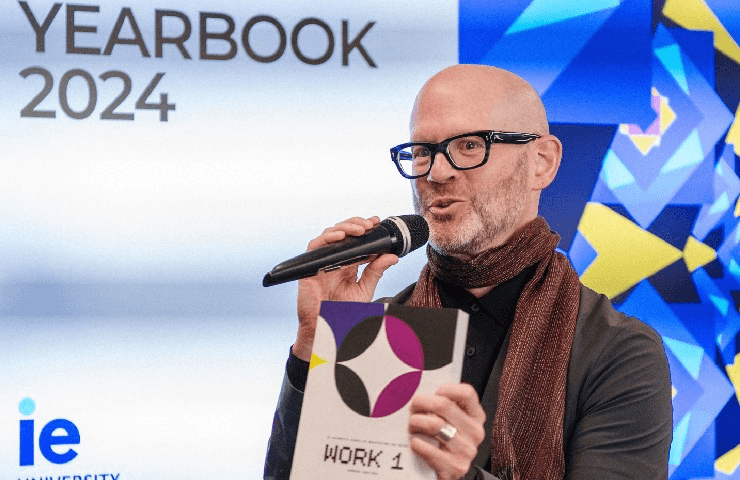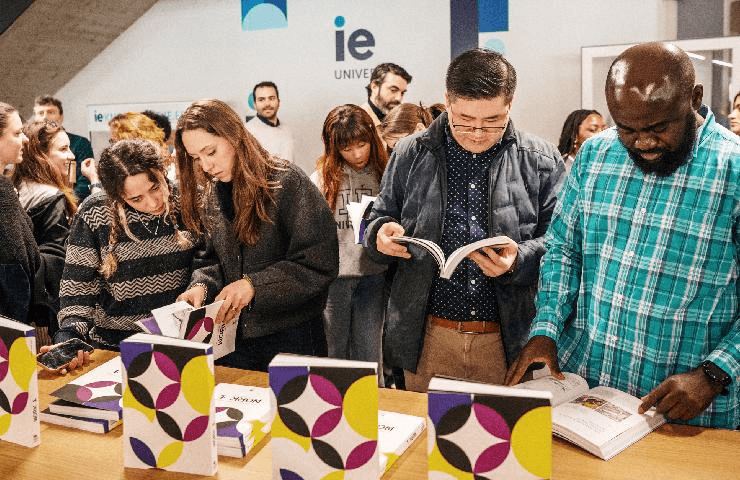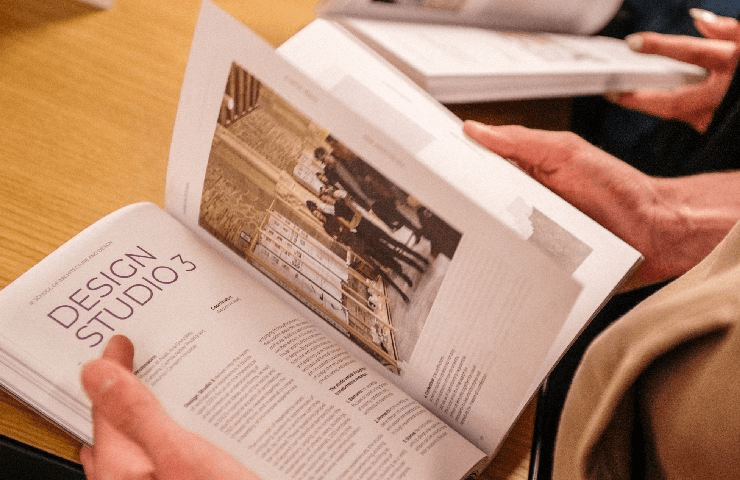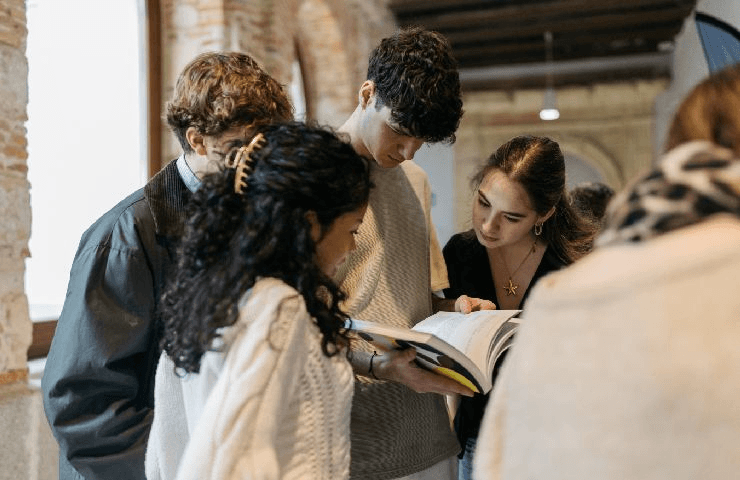IE School of Architecture and Design Presents WORK 1, Its Inaugural Yearbook
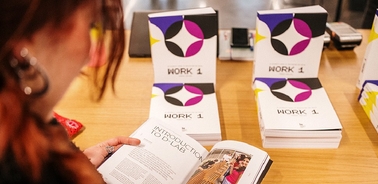
The publication chronicles a year of creativity, experimentation, and innovation in architecture and design at IE University.
IE School of Architecture and Design has launched WORK 1, its inaugural yearbook for the 2023-2024 academic year. The publication captures the School’s mission and pedagogical philosophy, highlighting its multidisciplinary approach, the focus on student-centered learning, critical thinking and hands-on experimentation.
As Dean David Goodman explains in the introduction of the book, developing human creativity for a better world is the School's central goal. Goodman emphasizes that "to develop, nurture, and deploy the power of human creativity to shape a more sustainable, more just, and more beautiful world" is a continuous "collective endeavor" built "one day at a time." The Dean celebrates key achievements, such as the launch of the Master in Architecture and the Bachelor in Fashion Design, and commends the "novel and ambitious work" produced by students and the "dedication and ingenuity" of faculty and staff. Progress, he notes, is built on daily efforts—"each day we get up and do the work, make something, meet someone new, listen, share, teach and look".
In her preface, Associate Dean Cristina Mateo highlights the evolving professional landscape shaped by technology and sustainability and she notes that "automation, digitalization, and AI are impacting the workforce," requiring adaptability and ethical awareness. She also underscores the school's commitment to a holistic sustainability approach, integrating "social, environmental, and economic sustainability solutions" with a "practical and professional focus." She stresses the often-overlooked role of social sustainability, asserting that "the importance of a strong sense of community is acknowledged as essential for livable societies."
The School's Design Studio model is central to the Bachelor experience, providing an immersive environment where students develop their own design perspectives through self-assessment, peer critique, and iterative experimentation. By actively engaging with the design process, students apply theoretical knowledge through practice. This pedagogical approach is complemented by the Fab Lab, which promotes material exploration through hands-on experimentation, and by the d-Lab, which integrates community engagement into design education. The MBArch Venture Lab further enriches the academic journey, encouraging an entrepreneurial mindset that bridges design thinking with business acumen.
At the Bachelor level, the book illustrates how design studios serve as experimental spaces where students explore sustainability, resourcefulness, and material innovation to adopt a responsible design approach. Projects like the Hacking the Masters lamps and Kiri Table emphasize material reuse, shifting perceptions of discarded materials as valuable resources, while Accelerating Pink critiques the environmental impact of fast fashion dyes. Spatial design is also a tool for advocacy and intervention, as seen in Design Studio 8, which focuses on urban regeneration in Zorrotzaurre, Bilbao. The Collaborative Design studio challenges individuality in design, promoting teamwork and interdisciplinary collaboration, reinforcing the evolving role of designers in societal discourse. Identity and narrative play a key role, helping students refine technical skills while deepening self-awareness and contextual understanding. Persona Polishing Bench, inspired by Pipilotti Rist, explores hidden personas through immersive environments, while branding projects like Donda critique identity formation.
At the Masters level, the projects featured in WORK 1 offer forward-thinking solutions to contemporary global challenges. The Master in Architecture addresses sustainability crises, exploring topics such as residential innovation (BSD Earth+ Lab), urban-nature integration (Baubotanik), bio-based architecture (Plantae), plastic waste upcycling (A Plastic Metabolism), and self-sustaining communities (Harvest Haven). The Master and Global Master in Real Estate Development focus on real-world development strategies, emphasizing sustainability, community integration, and adaptive reuse such as the transformation of a former IBM office into Re[spire], an innovation hub, or The Giuntura Life Science District project in Bologna that revitalizes a post-industrial area with a focus on health and sustainability. The Master in Business for Architecture and Design promotes an entrepreneurial mindset through the Venture Lab, where students develop real-world business proposals, such as Flow, an urban design consultancy focused on mitigating flood risks.
In its final section, titled Praxis, the book showcases a set of initiatives that connect academic learning with professional practice. D-Lab stands out as a learning environment where students engage in participatory design of social infrastructure, material testing and iterative experimentation. Its projects, such as the El Peñascal Schoolyard Revitalization, transform public spaces through community-driven interventions. Another initiative, the San Pedro de los Picos Restoration, is a collaboration with heritage organizations to prevent the collapse of a Romanesque church near Segovia. The project uses 3D scanning, historical documentation, and structural assessments to explore new community uses for the historic site.
The Fab Lab supports the school's learning-by-doing philosophy, enabling students to experiment with materials, develop hands-on skills and connect with a worldwide community of designers and technologists as part of the Global Fab Lab Network. Recent projects include the Replica of the Gothic Carving of the Virgen de la Fuencisla, in collaboration with a Segovia-based cultural association, where 3D scanning, digital modeling, and additive manufacturing were used to recreate the revered 15th-century sculpture. Another initiative, Advanced Digital Fabrication and Robotics, allows students to experiment with robotic arms and XL 3D printing for additive fabrication, exploring innovative applications in architecture.
The Center for Sustainable Cities is dedicated to transforming urban environments through consultation, research, and education promoting collaboration with professionals, academics, and local communities through workshops and seminars. It provides expert analysis and strategic solutions for sustainable urban development, offering tailored recommendations from city-wide projects to specific building-scale decarbonization strategies. Notable projects include a sustainable urban development assessment for the firm Serviland, a participatory neighborhood identity initiative in Madrid's Fuencarral neighborhood, and a seminar with Madrid City Hall on technology-driven urban futures.
Prologue is a student-led magazine at IE University that explores the built environment through an interdisciplinary lens, merging academic rigor with contemporary discourse. It serves as a platform for young designers, architects, and researchers to engage in dialogue with established professionals.
WORK 1 is available in print through IE University stores and in digital format here.
